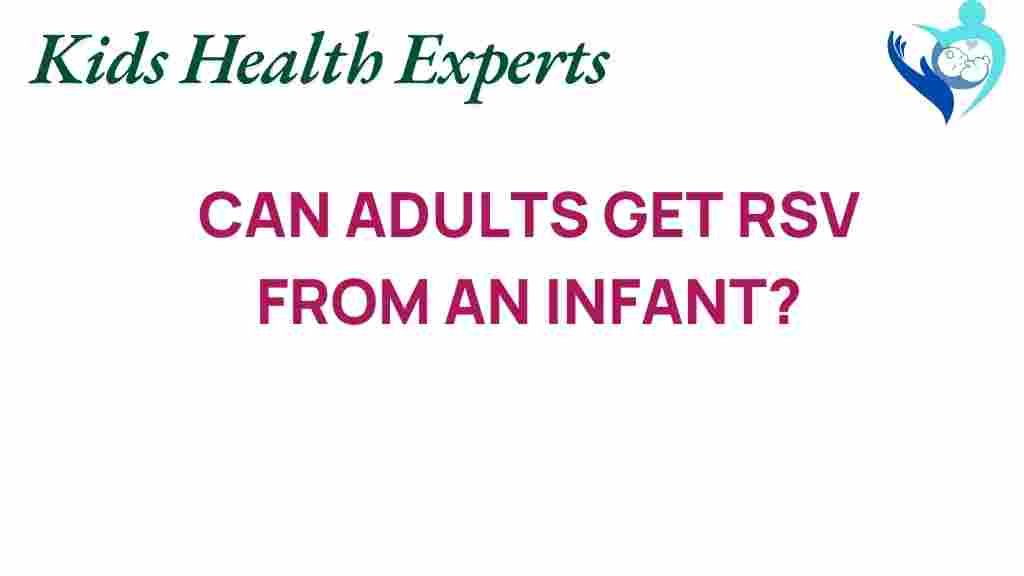Unraveling the Mystery: Can Adults Contract RSV from Infants?
Respiratory Syncytial Virus (RSV) is widely known for its impact on infants and young children, but many wonder: can adults contract RSV from infants? This mystery regarding RSV transmission, symptoms, prevention, and health consequences is particularly relevant as the virus becomes more prevalent during certain seasons. Understanding the dynamics of RSV is crucial for caregivers of infants and for adults who may be at risk. In this article, we will delve into the transmission of RSV, its symptoms in adults, and effective prevention strategies.
Understanding RSV
RSV, or respiratory syncytial virus, is a common virus that causes respiratory infections. It primarily affects infants, young children, and the elderly. While most adults have developed immunity to the virus over the years, they can still contract it, especially if they are exposed to the virus from infants or young children who are infected.
Transmission of RSV
RSV is highly contagious and spreads through the following methods:
- Direct Contact: When an infected person touches or hugs an infant, the virus can transfer to the adult.
- Airborne Droplets: RSV can spread when an infected individual coughs or sneezes, releasing droplets into the air.
- Contaminated Surfaces: Adults can contract RSV by touching surfaces contaminated with the virus, such as toys, doorknobs, and countertops.
It’s important to note that infants are often the primary source of infection for adults, especially in family settings where close contact occurs.
Symptoms of RSV in Adults
While RSV primarily affects infants, adults can exhibit symptoms as well. The symptoms can range from mild to severe and may include:
- Runny or stuffy nose
- Coughing
- Sore throat
- Fever
- Fatigue
- Shortness of breath or wheezing
In healthy adults, RSV typically presents as a mild cold. However, those with weakened immune systems or underlying health conditions may experience more severe symptoms, including bronchitis or pneumonia.
Who Is at Risk?
While any adult can contract RSV from infants, certain groups are at a higher risk:
- Adults with weakened immune systems
- Older adults, particularly those over 65
- Individuals with chronic lung or heart conditions
- Pregnant women, particularly in their third trimester
Understanding these risk factors can help in taking appropriate precautions.
Preventing RSV Infection
Preventing RSV transmission is essential, especially for those who are at higher risk. Here are some effective strategies:
- Hand Hygiene: Regular handwashing with soap and water, or using hand sanitizer, can reduce the risk of infection.
- Avoid Close Contact: Limit close contact with sick infants, especially during RSV season, which typically runs from fall to spring.
- Disinfect Surfaces: Regularly disinfect surfaces that may be contaminated with RSV, particularly in areas where infants spend time.
- Stay Home When Sick: If you or your child is sick, it’s important to stay home to prevent spreading the virus to others.
- Vaccination: While there is no vaccine for RSV currently available for adults, staying up-to-date with other vaccinations can help boost overall immunity.
Step-by-Step Guide to Reducing the Risk of RSV Transmission
Here’s a simple step-by-step guide for adults to minimize the risk of contracting RSV from infants:
- Practice Good Hygiene: Wash hands frequently, especially after touching infants.
- Avoid Touching Face: Refrain from touching the face, especially the eyes, nose, and mouth, after handling infants.
- Limit Visitors: During RSV season, limit visitors to your home, especially if they are sick.
- Keep Infants Away from Crowds: Avoid crowded places with infants during peak RSV season.
- Monitor Symptoms: Be vigilant for any symptoms of RSV in yourself or your children, and seek medical advice if symptoms arise.
Troubleshooting Tips for Parents and Caregivers
For parents and caregivers, here are some troubleshooting tips to manage RSV concerns:
- Inform Caregivers: Ensure that all caregivers are aware of RSV symptoms and prevention measures.
- Educate Family Members: Teach family members about the importance of hand hygiene and staying away when sick.
- Consult Healthcare Providers: If your infant shows signs of respiratory distress, consult a healthcare provider promptly.
Health Implications of RSV in Adults
While many adults recover from RSV without complications, it can lead to serious health issues in those at risk. Complications can include:
- Pneumonia
- Bronchitis
- Worsening of chronic respiratory conditions
It’s essential for adults experiencing severe symptoms to seek medical attention. Early intervention can lead to better outcomes.
Building Immunity Against RSV
Though most adults have some immunity to RSV from past infections, there are ways to strengthen overall immunity:
- Healthy Diet: Eating a balanced diet rich in fruits, vegetables, and whole grains can support immune health.
- Regular Exercise: Engaging in regular physical activity can boost the immune system.
- Adequate Sleep: Ensure you are getting enough restful sleep to help your body recover and strengthen immunity.
- Manage Stress: High-stress levels can weaken the immune system; practicing stress management techniques is beneficial.
Conclusion
In conclusion, adults can contract RSV from infants, and understanding this transmission is vital for health and safety. The symptoms in adults may be mild, but those at higher risk should take precautions to prevent infection. Practicing good hygiene, avoiding close contact during RSV season, and staying informed about symptoms and prevention strategies are key steps to reducing the risk of contracting RSV. For more information on RSV and health, consider visiting CDC’s RSV page. By being proactive, adults can protect themselves and their infants from the potential complications of respiratory syncytial virus.
For further reading on respiratory health, check out our article on common respiratory viruses and their impact.
This article is in the category Conditions and created by KidsHealthExperts Team
